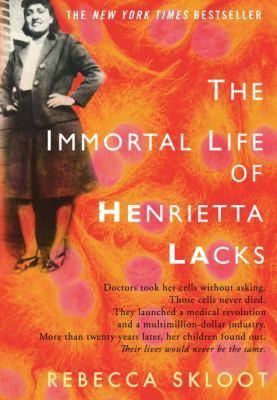The Immortal Life of Henrietta Lacks by Rebecca Skloot Book Summary
Discover the powerful story behind "The Immortal Life of Henrietta Lacks" by Rebecca Skloot. Explore key insights, a comprehensive summary, and an in-depth review of this groundbreaking book that intertwines ethics, race, and medical history. Uncover how Henrietta's cells changed science forever.
The Immortal Life of Henrietta Lacks Book Summary
The Immortal Life of Henrietta Lacks by Rebecca Skloot unveils the extraordinary story behind the woman whose cells revolutionized medical science. This gripping narrative blends science, ethics, and personal history, revealing how Henrietta’s cells, taken without her consent, led to groundbreaking discoveries. Dive into a compelling exploration of medical innovation, racial injustice, and the human story that changed the face of research forever.
Discover profound insights on rare, unpredictable events in The Black Swan: The Impact of the Highly Improbable Book Summary, Review & Key Insights to better understand uncertainty and risk.
The Immortal Life of Henrietta Lacks by Rebecca Skloot - Introduction
I had no idea that a single woman’s cells could literally change the course of medical history—and yet, that’s exactly what Henrietta Lacks did. When I picked up The Immortal Life of Henrietta Lacks by Rebecca Skloot, I thought it was just going to be another science book, but it turned out to be so much more. It’s this incredible blend of nonfiction, science, history, and biography all rolled into one.
What really surprised me was how Henrietta’s cells were taken without her knowledge back in the 1950s and became the first immortal human cell line, leading to countless medical breakthroughs. It made me rethink the whole idea of consent and ethics in medicine—something I never really questioned before.
I started this book because I was curious about the science behind cell research, but it quickly became a story about her family, the medical system, and the human side of scientific progress. If you’re someone who loves biography memoirs, or you’re into medical history and want a book that’s both eye-opening and deeply personal, this one’s for you. It’s perfect for book clubs too, since it sparks so many important conversations.
At around 370 pages, it’s a solid read but totally worth the time—whether you listen to the audiobook version on your commute or dive in with the physical copy. Honestly, I couldn’t put it down, and I think you’ll feel the same way once you start.
What is The Immortal Life of Henrietta Lacks About?

The Immortal Life of Henrietta Lacks by Rebecca Skloot chronicles the life of Henrietta Lacks, whose cancer cells were taken without her knowledge and became one of the most important tools in medicine, leading to groundbreaking research and ethical discussions. The book's main message highlights the intersection of race, ethics, and medical research, emphasizing the need for informed consent and respect for individuals. Key concepts include the impact of Henrietta's cells on scientific advancements, the ethical implications of using human subjects in research, and the personal story of Henrietta's family grappling with her legacy.
About Book Author - Rebecca Skloot
Rebecca Skloot didn't just stumble upon the story of Henrietta Lacks; it was a seed planted years ago, in a community college biology class, that blossomed into a decade-long, deeply personal quest.
- What's interesting about Rebecca is that her early immersion in science wasn't solely in labs or textbooks; she spent considerable time as a veterinary technician, a detail that perhaps underscores her profound empathy and understanding of life's complexities. This hands-on experience, coupled with an incredible tenacity for investigative storytelling, allowed her to navigate the intricate worlds of science, race, and family. Her unique gift lies in making complex subjects profoundly human and accessible, a skill honed through years of writing for publications and teaching. It was her unwavering commitment and ability to build genuine trust with the Lacks family, over many years, that truly qualified her to tell this monumental story about medical ethics and human dignity with such depth and sensitivity.
More Books To Find
The Immortal Life of Henrietta Lacks - Book Overview
It's about a woman named Henrietta Lacks, whose cancer cells were taken without her knowledge in the 1950s and became one of the most important tools in medicine. Her cells, known as HeLa cells, were used for breakthroughs in everything from cancer research to the development of the polio vaccine.
The author, Rebecca Skloot, wrote it not just to tell Henrietta's story but to highlight the ethical dilemmas in medical research, especially regarding race and consent. Skloot wanted to give a voice to Henrietta and her family, who were largely ignored in the narrative of scientific progress.
What makes this book different from others is its blend of personal narrative and scientific history. It dives deep into Henrietta's life, her family's struggles, and the broader implications of her cells being used without permission. It's not just a dry recounting of facts; it’s a human story that evokes empathy.
One story that really stuck with me was when Henrietta's daughter, Deborah, learns about her mother's impact on science. She goes on a journey to understand who her mother was, grappling with feelings of loss and anger. It’s a poignant reminder of how science can often overlook the human side of its subjects, and it really drives home the importance of acknowledging and respecting individuals in research.
Key Insights of The Immortal Life of Henrietta Lacks
The Immortal Life of Henrietta Lacks offers profound insights into the intersection of ethics, race, and medical research.
1. Ethical Concerns: The book highlights the ethical implications of using human cells for research without consent. Henrietta's cells, known as HeLa cells, were taken without her knowledge, raising questions about patient rights and informed consent.
2. Racial Inequality: It sheds light on the racial disparities in medical treatment and research. Henrietta, an African American woman, faced systemic discrimination, illustrating how race influenced her medical care and the subsequent exploitation of her cells.
3. Impact on Science: HeLa cells revolutionized medical research, contributing to breakthroughs in cancer treatment, vaccines, and more. This underscores the unintended consequences of scientific advancements derived from unethical practices.
4. Personal Narrative: The author intertwines Henrietta's personal story with the scientific narrative, emphasizing the human element behind scientific progress. This approach creates a deeper emotional connection and highlights the importance of recognizing individuals in research.
5. Legacy and Memory: The book explores how Henrietta's legacy continues to impact science and ethics today. It raises awareness about the need for acknowledgment and respect for individuals who contribute to scientific advancements, ensuring their stories are not forgotten.
These insights encourage readers to reflect on the moral responsibilities of researchers and the importance of ethical practices in science.
Who Should Read This Book
"The Immortal Life of Henrietta Lacks" is a must-read for anyone interested in the intersection of ethics, science, and race. It appeals to medical professionals, researchers, and students who seek to understand the human stories behind scientific advancements. Additionally, those passionate about social justice and the historical exploitation of African Americans in medicine will find the book enlightening. Readers who enjoy compelling narratives that blend biography with social commentary will also appreciate Skloot's engaging writing style, making it a valuable read for a broad audience.
Read If You Are
- Interested in the ethical implications of medical research and consent
- A fan of compelling true stories that intertwine science and personal narratives
- Seeking to understand the impact of race and history on healthcare and scientific advancement
Skip If You Are
- Not interested in medical ethics or the history of science
- Prefer fast-paced fiction over non-fiction narratives
- Unconcerned with the impact of race and social issues in healthcare
Important Takeaways from this Book
-
Educate Yourself on Medical Ethics: Research the principles of informed consent and patient rights. Understanding these concepts is crucial to advocating for yourself and others in medical settings. This knowledge empowers you to make informed decisions and ensures that your rights are respected.
-
Start a Health Journal: Document your medical history, treatments, and personal health experiences. This habit not only helps you track your health but also prepares you to share valuable information with healthcare providers. A well-maintained journal can lead to better healthcare outcomes and personalized treatment.
-
Engage in Conversations About Race and Medicine: Initiate discussions about the disparities in healthcare access and treatment based on race. This action fosters awareness and encourages others to reflect on these issues. By creating an open dialogue, you contribute to a more equitable healthcare environment.
-
Support Medical Research Transparency: Choose to participate in clinical trials or research studies that prioritize ethical standards and informed consent. Engaging with research helps advance medical knowledge while ensuring that participants are treated with respect and dignity. Your involvement can lead to breakthroughs that benefit society.
-
Advocate for Patient Rights: Join or support organizations that focus on healthcare advocacy and patient rights. By aligning with these groups, you amplify your voice and contribute to systemic change. This action not only benefits you but also helps protect the rights of others in the healthcare system.
Book Review
I picked up "The Immortal Life of Henrietta Lacks" expecting a straightforward biography, but what I got was a deeply layered exploration of ethics, race, and the intersection of science and humanity. Rebecca Skloot’s writing style is engaging and accessible, which made the complex topics feel relatable. The pacing was spot-on, alternating between Henrietta’s story and the broader implications of her immortal cells, known as HeLa.
One of the book's greatest strengths is Skloot's ability to humanize Henrietta and her family. For instance, the detailed accounts of her life and the struggles her family faced after her death added emotional depth. I found myself genuinely invested in their journey, especially when Skloot described how Henrietta's cells changed the landscape of medical research while her family remained in the dark.
However, there were moments where I felt the narrative could have delved deeper into certain scientific explanations. While the balance between science and personal story was mostly well-handled, some sections felt rushed, especially when discussing the implications of HeLa cells in modern research.
In comparison to other books like "The Immortal Life," such as "The Gene" by Siddhartha Mukherjee, I found Skloot’s work more personal and emotionally resonant, while Mukherjee focused more on the scientific narrative.
Overall, I highly recommend this book to anyone interested in medical ethics or social justice. However, if you're looking for a purely scientific account, you might find it lacking in technical depth. Skloot's blend of storytelling and research makes it a must-read for those who appreciate the human side of science.
Final Thoughts
If I'm being honest, finishing The Immortal Life of Henrietta Lacks left me with a profound sense of both admiration and sadness. The book beautifully intertwines the story of Henrietta and the ethical dilemmas surrounding medical research, making it a compelling read. I'd definitely recommend this if you're interested in medical ethics or the intersection of race and science. However, skip this one if you're looking for a light read; it's heavy and thought-provoking.
The thing that surprised me most was how little I knew about the impact of HeLa cells on modern medicine and the personal story behind them. It’s a reminder of the real human lives behind scientific advancements. Months from now, I think what will stick with me is the resilience of Henrietta's family and the ongoing conversations about consent and ethics in research.
As for whether I'd read it again, I think I’d prefer to recommend the full book over just a summary. It’s rich in detail and emotion that you really can’t capture in a brief recap. Overall, my reading experience was eye-opening, and I appreciated the depth of Skloot's storytelling.
Frequently Asked Questions
How long does it take to read The Immortal Life of Henrietta Lacks?
The Immortal Life of Henrietta Lacks by Rebecca Skloot is 370 pages long. On average, it takes about 8-10 hours to read, depending on your reading speed. Enjoy the journey through this captivating and thought-provoking narrative!
What makes "The Immortal Life of Henrietta Lacks" different from other books in this genre?
The Immortal Life of Henrietta Lacks uniquely blends scientific exploration with a deeply personal narrative, highlighting ethical issues in medical research. It humanizes the story behind HeLa cells, connecting readers emotionally to Henrietta's legacy and the impact on her family, setting it apart from typical science literature.
Who is the target audience for The Immortal Life of Henrietta Lacks
The target audience for "The Immortal Life of Henrietta Lacks" includes readers interested in medical ethics, history, and race relations. It appeals to those curious about scientific advancements, personal stories, and the impact of Henrietta Lacks' legacy on healthcare and bioethics.
Are there any criticisms or limitations of The Immortal Life of Henrietta Lacks
Critics note that the book sometimes oversimplifies complex scientific concepts and may not fully represent the perspectives of Henrietta Lacks' family. Additionally, some argue that it could have explored ethical issues surrounding consent and exploitation in greater depth.
What is the main theme of The Immortal Life of Henrietta Lacks by Rebecca Skloot
The main theme of "The Immortal Life of Henrietta Lacks" explores the intersection of ethics, race, and medical research. It highlights the exploitation of Henrietta Lacks’ cells without her consent, raising questions about the value of human life and the impact of scientific advancements on marginalized communities.
Tags:
Rebecca Skloot, The Immortal Life of Henrietta Lacks, The Immortal Life of Henrietta Lacks Author, The Immortal Life of Henrietta Lacks Book, The Immortal Life of Henrietta Lacks Book Description, The Immortal Life of Henrietta Lacks Book Rating, The Immortal Life of Henrietta Lacks Book Review, The Immortal Life of Henrietta Lacks by Rebecca Skloot, The Immortal Life of Henrietta Lacks ISBN, The Immortal Life of Henrietta Lacks Short Summary

Michel Fisher
Michel Fisher is a passionate fiction enthusiast and book blogger who writes about emotional reads, character-driven stories, and contemporary romance authors that captivate hearts and minds.

The Immortal Life of Henrietta Lacks
Book Overview
Description
Her name was Henrietta Lacks, but scientists know her as HeLa. She was a poor Southern tobacco farmer who worked the same land as her slave ancestors, yet her cells—taken without her knowledge—became one of the most important tools in medicine. The first “immortal” human cells grown in culture, they are still alive today, though she has been dead for more than sixty years. If you could pile all HeLa cells ever grown onto a scale, they’d weigh more than 50 million metric tons—as much as a hundred Empire State Buildings. HeLa cells were vital for developing the polio vaccine; uncovered secrets of cancer, viruses, and the atom bomb’s effects; helped lead to important advances like in vitro fertilization, cloning, and gene mapping; and have been bought and sold by the billions.Yet Henrietta Lacks remains virtually unknown, buried in an unmarked grave.Now Rebecca Skloot takes us on an extraordinary journey, from the “colored” ward of Johns Hopkins Hospital in the 1950s to stark white laboratories with freezers full of HeLa cells; from Henrietta’s small, dying hometown of Clover, Virginia — a land of wooden slave quarters, faith healings, and voodoo — to East Baltimore today, where her children and grandchildren live and struggle with the legacy of her cells.Henrietta’s family did not learn of her “immortality” until more than twenty years after her death, when scientists investigating HeLa began using her husband and children in research without informed consent. And though the cells had launched a multimillion-dollar industry that sells human biological materials, her family never saw any of the profits. As Rebecca Skloot so brilliantly shows, the story of the Lacks family — past and present — is inextricably connected to the dark history of experimentation on African Americans, the birth of bioethics, and the legal battles over whether we control the stuff we are made of.Over the decade it took to uncover this story, Rebecca became enmeshed in the lives of the Lacks family—especially Henrietta’s daughter Deborah, who was devastated to learn about her mother’s cells. She was consumed with questions: Had scientists cloned her mother? Did it hurt her when researchers infected her cells with viruses and shot them into space? What happened to her sister, Elsie, who died in a mental institution at the age of fifteen? And if her mother was so important to medicine, why couldn’t her children afford health insurance?Intimate in feeling, astonishing in scope, and impossible to put down, The Immortal Life of Henrietta Lacks captures the beauty and drama of scientific discovery, as well as its human consequences.
Key Points
HeLa cells revolutionized medical research
Characters
Henrietta Lacks
Publisher
Crown Publishing Group
First Publish Date
Awards
Ambassador Book Award for American Studies (2011), Audie Award for Nonfiction (2011), Chicago Tribune Heartland Prize for Nonfiction (2010), Wellcome Book Prize (2010), Puddly Award for Nonfiction (2011), Goodreads Choice Award for Nonfiction and Debut Author and Nominee for Favorite Book (2010), AAAS/Subaru SB&F Prize for Excellence in Science Books for Young Adult Science Book (2011)





